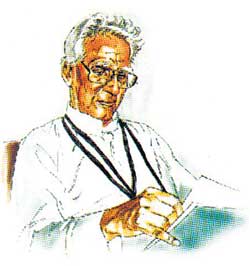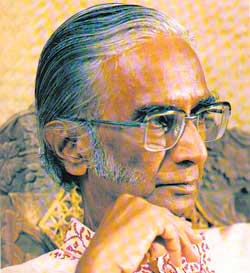Fr. Marcelline Jayakody
The Roman Catholic priest who was an acclaimed lyricist and poet, Fr. Marcelline Jayakody (O.M.I) was born on June 3, 1902. Son of an ayurvedic doctor from Sandalankawa, his mother was born a Buddhist. Having studied at the Roman Catholic Boys School, Madampe and later at St. Joseph's College, Colombo and
St. Aloysius Seminary, Borella, he was ordained a Catholic priest on December 2, 1927.
As parish priest at Duwa, Negombo he took the bold step of changing the script of the original Duwa passion play and introduced live actors in place of puppets, used till then. He played a key role in giving a local flavour to church music composing many hymns and carols moving away from dubbed Latin hymns and western melodies.
He was assigned the task of training the choir to sing 'Namo Namo Matha,' at the independence celebrations in 1948 and its impact is said to have contributed to the song being accepted as the National Anthem. The lyrics he wrote for the songs, 'Olu Nelum Neriya,' and 'Vesak Kekulu,' in Lester James Peries' film, 'Rekawa' set to the music of Sunil Shantha are appreciated to this day. Sunil Shantha sang the English song, 'My Dreams are Roses' which
Fr. Jayakody wrote for the film, 'Romeo saha Juliet Kathawak' (1969), directed by G. D. L. Perera.
His interest in music took him to Ravindranath Tagore's internationally acclaimed Indian school of music, 'Shantiniketan.'
He has scored several 'firsts.' When he won the State Literary Award for his book of poems, 'Muthu,' in 1979, he was the first Catholic priest to have won such an award. He was also the first Catholic priest to win the Roman Magsaysay Award (1983).
He was editor of the Catholic newspaper 'Gnanartha Pradeepaya,' and was actively involved with the Sinhala Poets Association of which he was president for several decades.
He died on January 15, 1998 at the age of 96. A commemorative stamp was issued to mark his 103rd birth anniversary. |


